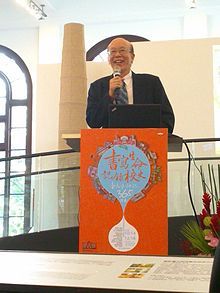Lee Si-chen
Lee Si-chen | |
|---|---|
| 李嗣涔 | |
 | |
| Born | August 13, 1952 (age 72) |
| Nationality | Taiwanese |
| Other names | Si-Chen Lee |
| Alma mater | National Taiwan University (BS)
Stanford University (MS, PhD) |
| Occupation(s) | Electrical engineer and professor |
Lee Si-chen (Chinese: 李嗣涔; pinyin: Lǐ Sìcén; Wade–Giles: Lǐ Sì-tsén; Pe̍h-ōe-jī: Lí Sû-chhâm; born 13 August 1952 in Gangshan, Kaohsiung, Taiwan), is a Taiwanese engineer specializing in semiconductors, a researcher in amorphous silicon in the early development in Taiwan, and an IEEE Fellow. He has been a professor of electrical engineering since 1982 and the president of National Taiwan University from 2005 to 2013.
Biography
[edit]This section needs expansion. You can help by adding to it. (June 2008) |
Education
[edit]He received a bachelor's degree in electrical engineering from National Taiwan University (1974) and a master's degree (1977) and PhD (1981), both in electrical engineering, from Stanford University.
Present positions
[edit]He is the current president of National Taiwan University (2005 – ), president of the Association of National Universities of Taiwan (2006 – )[1] and chair of the University Mobility in Asia and the Pacific (2005 – ). He is also a professor of electrical engineering at the National Taiwan University (1985 - ).[2][3]
Experiences and Trainings[citation needed]
[edit]- IEEE Fellow (2002)
- Dean of Academic Affairs, National Taiwan University (1996–2002)
- Assistant to the Minister of National Defense (1993–1994)
- Director, Department of Electrical Engineering, National Taiwan University (1989–1992)
- Vice Directorate, IEEE Taipei Section (2001–2002)
- Directorate, Chinese Association of Electromagnetism in Life Science (1999–2004)
- Associate Editor, Materials Chemistry and Physics (1992–2004)
- Associate professor, Department of Electrical Engineering, National Taiwan University (1982–1985)
- Researcher, Energy Conversion Devices, Inc., Troy, Michigan (1980–1982)
- Associate Editor, Journal of Chinese Engineers (1996–2000)
- Leader, Bioenergy Field Group, Biology Department, National Science Council (1992–1998)
- Directorate, Association of Chinese Electrical Engineers (1992–1994)
- Leader, Microelectronics Group, Engineering Department, National Science Council (1988–1993)
- Consultant, ERSO of ITRI (1991–1992 and 1986–1989)
Awards[citation needed]
[edit]- The Degree of Doctor Honoris Causa Conferred by Kansai University (2005)
- Institute of Electrical and Electronics Engineers 47th Academic Award of Ministry of Education (2003)
- Annual Medal from the Chinese Association of Electrical Engineers (2002)
- IEEE Fellow (2002)
- IEEE Third Millennium Medal for outstanding achievements and contributions on electronic devices (2000)
- Member of Asia-Pacific Academy of Materials (1997)
- Special contracted researcher of National Science Council (1996–2002)
- Outstanding Research Awards of National Science Council (1986–1996)
- Young Distinguished Engineer of Chinese Engineer Association (1987)
- Sun Yat-Sen Academic Award (Engineering) (1987)
Interest in Psychic Abilities
[edit]He is interested in the scientific research of Chinese Qigong and extrasensory perception.[4]
References
[edit]- ^ "The Official Establishment of NTUAA-NA on August 11th, 2012". Retrieved 2 October 2014.
- ^ "Official Homepage", accessed May 10, 2011.
- ^ Faculty profile
- ^ "List of Lee's publications regarding psychic abilities", accessed May 10, 2011.
